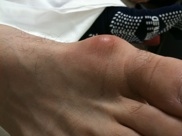What Causes Gout?
Gout attacks are caused by deposits of crystallized uric acid in the joint. Uric acid is present in the blood and eliminated in the urine, but in people who have gout, uric acid accumulates and crystallizes in the joints. Uric acid is the result of the breakdown of purines, chemicals that are found naturally in our bodies and in food. Some people develop gout because their kidneys have difficulty eliminating normal amounts of uric acid, while others produce too much uric acid.
Gout occurs most commonly in the big toe because uric acid is sensitive to temperature changes. At cooler temperatures, uric acid turns into crystals. Since the toe is the part of the body that is furthest from the heart, it’s also the coolest part of the body—and, thus, the most likely target of gout. However, gout can affect any joint in the body.
The tendency to accumulate uric acid is often inherited. Other factors that put a person at risk for developing gout include: high blood pressure, diabetes, obesity, surgery, chemotherapy, stress, and certain medications and vitamins. For example, the body’s ability to remove uric acid can be negatively affected by taking aspirin, some diuretic medications (“water pills”), and the vitamin niacin (also called nicotinic acid). While gout is more common in men aged 40 to 60 years, it can occur in younger men and also occurs in women.
Consuming foods often high in proteins and beverages that contain high levels of purines can trigger an attack of gout. Some foods contain more purines than others and have been associated with an increase of uric acid, which leads to gout. You may be able to reduce your chances of getting a gout attack by limiting or avoiding the following foods and beverages: shellfish, organ meats (kidney, liver, etc.), red wine, beer, and red meat.
Diagnosis
In diagnosing gout, the foot and ankle surgeon will take your personal and family history and examine the affected joint. Laboratory tests and x-rays are sometimes ordered to determine if the inflammation is caused by something other than gout...
Treatment
Prompt examination, diagnosis and treatment by the podiatrist will stop your pain and reduce the frequency of gout attacks.
